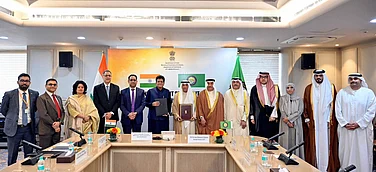SIX months ago, when the Government was considering elections in Jammu and Kashmir, this was the sequence of events:
May 16 : The debris of the charred Chrar-e-Sharief still draws shocked Kashmiris and journalists. Prime Minister P.V. Narasimha Rao reiterates in Parliament the Government's resolve to go ahead with elections in Jammu and Kashmir. He says President's rule gave diminishing returns after two-three years. He also pledges greater autonomy for the state.
May 17: Chief Election Commissioner T.N. Seshan says the situation in Jammu and Kashmir has improved. He would go ahead with the polls if nothing serious happened.
Seshan appoints returning officers in the 87 Assembly constituencies in the state.
May 26: Seshan goes to Jammu and Kashmirto assess the situation.
May 27: Seshan declares that the majority of the party leaders who met him are of the view that the situation in the state is not conducive to holding elections. He meets the Prime Minister the next day.
May 31: President Shankar Dayal Sharma approves a six-month extension of President's rule in Jammu and Kashmir. And the sequence of events this month:
November 2: Rao and National Conference chief Farooq Abdullah hold a two-hour meeting. Farooq iterates his demand for autonomy. The Prime Minister leaves for Burkina Faso.
November 4: The Cabinet meets with Home Minister S.B. Chavan in the chair. It announces its decision to hold elections. A little later Rao announces his package for Jammu & Kashmir in a special broadcast from Ouagadougou, Burkina Faso.
November 8: The National Conference meets and demands postponement of the polls. The party says it will boycott elections.
The same day, Seshan visits Jammu and Kashmir along with the two other election commissioners, M.S. Gill and G.V.G. Krishnamurthy for an on-the-spot assessment. Seshan says they have been getting "mixed signals'' from the various political parties. Apart from the Congress, all parties were opposed to the poll.
November 9: The Prime Minister has not yet returned. The EC meeting to decide on the polls is postponed. The reason given out is Krishnamurthy's illness.
November 10: The Prime Minister returns. The EC holds a three-hour meeting and decides not to hold elections in Jammu and Kashmir.
EVER since Jammu and Kashmir was placed under President's rule five-and-a-half years back, the history of the extension of Central rule in the state has repeated itself with its customary monotony. This time, however, there was a greater sense of drama, provided by the unusual recording of the Prime Minister's package broadcast from Burkina Faso. And, of course, there was the inherent element of farce in the repetition of history. Not without reason, many officials in the Union Home Ministry, who had done no other work except in relation to the expected elections, are referring to the entire episode as the "farce from Faso".
So, once again, Jammu and Kashmir turned out to be the contest that never was. But unlike other instances, this one had a winner of sorts, and losers too.
The winner, undoubtedly, was Farooq Abdullah, aptly titled as the "prodigal son" in the latest biography on him to hit the stands. For, as the former chief minister stood firm against the cajoling, and even bullying tactics of the Central leaders, there was a perceptible thawing of attitudes towards him in the Kashmir Valley.
Just a month back, he was dismissed universally in Kashmir as a man without guts, as New Delhi's stooge, and a man who would shortly be installed as the puppet chief minister of the state after a farcical poll in which only a small segment of the population would participate.
When the National Conference announced on November 8 that it would boycott the elections unless the Centre spelt out an acceptable package for the state's autonomy, even his detractors were surprised. And when two days later the EC declared that it did not find the situation in the strife-torn state conducive to free and fair elections, there was subdued euphoria and grudging respect for the prodigal who had returned to his people. For, the people in the Valley were well aware that the elections would have been held despite the opposition of the Hurriyat leaders. The inescapable feeling was that by standing up firmly, Farooq had achieved the near-impossible. Earlier top Hurriyat leaders like Shabir Shah, A.G. Lone and Syed Shah Geelani, even while expressing their strong opposition to the polls, had pleaded helplessness in stopping the elections, saying that the Centre could manage it with the help of guns.
For, despite the apparently farcical run-up to the non-election, it was evident that the Government was serious this time about holding the polls. It would have gone ahead, with or without Farooq's party as a redeeming presence. For one, this was planned as Rao's trump-card for the general elections slated to be held in the first half of next year. The polls for the Punjab Assembly had been held at the beginning of his tenure. Kashmir had been pegged as his final glory. It was partly with this in mind that Rao had taken over the charge of Kashmir affairs himself.
In the last six months, the Kashmir desk in the Home Ministry and the intelligence agencies had done practically nothing except to monitor the situation in the Valley with the view of holding elections. The Cabinet had decided on a series of amendments to facilitate the holding of polls only last week. And nearly 30 companies of additional paramilitary forces (about 3,000 personnel) had been pulled out from far-off places like Assam, and were on their way to Srinagar for poll deployment there.
On the political front, the preparations had started way back. The Congress state unit president Ghulam Rasool Kar was encouraged to travel and campaign for the polls at great risk to his life in both Jammu and the Valley. This he did with great gusto. Further, both the Government and the party kept dropping dark hints that they would go ahead with the elections even if the National Conference did not participate.
The aim was quite clearly to put Farooq under pressure. And carefully planted stories in the media spoke of how he could not afford not to contest, as this would make the National Conference as redundant as the Akali Dal had become after its boycott of the Punjab Assembly polls.
Side by side, of course, were the constant assurances to Farooq that some kind of autonomy package would be worked out, climaxing with the Prime Minister's Ouagadougou declaration of intent. The specially telecast package offer had been carefully fine-tuned for its emotive aspect as it not only largely conformed to the 1975 accord between Indira Gandhi and Sheikh Abdullah, but also ceded ground on which no agreement had been reached then: that the nomenclature of the chief minister and the governor could be reverted to wazir-e-azam and sadr-e-riasat, if the Assembly so desired.
But Farooq was a witness to the emergence of hostility in certain quarters of Kashmiri society when the 1975 accord had been signed. He is also aware that neither does he have the Sheikh's stature to be able to sell such a package to the people, and nor is the situation the same as it was two decades ago. He stuck to his guns and said he would not participate unless the pre-1953 status is restored.
THE Government knew that unlike Punjab, where the demographic pattern is very different from Kashmir, elections in the Valley would have no credibility without at least the National Conference. It buckled and the plans for elections were jettisoned. Farooq was naturally jubilant.
As for the losers of the non-contest, the biggest one, of course, is the Government led by Rao and his Home Minister S.B. Chavan. Even if the Election Commission's decision is taken as an independent one (many still suspect it was a command performance, the claims of a unanimous decision notwithstanding), its assessment about the situation in the state not being conducive to the polls blows the lid off the Government's claims to the contrary. The development could not but have left Chavan red in the face for, only a day before the EC's decision the home minister had declared that the polls would be held even in the face of the National Conference's boycott. Further, the package announced by Rao has given the BJP a new stick to beat the Government with in the next general elections. The party seized upon the issue both in its national executive meeting in Pune and at the national council session in Bombay last week. As for Kar, his predicament is pitiable. Although he bravely declared that he would continue his campaign, he could not hide his feelings when asked whether he felt letdown by the party leadership. "It is unfortunate. I am depressed. Beyond that I can say nothing."
However, there is some good news for the Government too. After a gap of almost six years, Farooq Abdullah, the only nationalist voice in the Valley, has managed to gain some credibility. If he can build on it, and begin to win the confidence of his people, it could well stand India in good stead in the long run. But the long-term interest hardly enthuses the Congressman who is worried about the Kashmir fall-out in the upcoming general elections. Says a senior Congress leader: "Who can tell what will happen in the long term. Have you forgotten what Keynes had said? In the long term we are all dead."






















